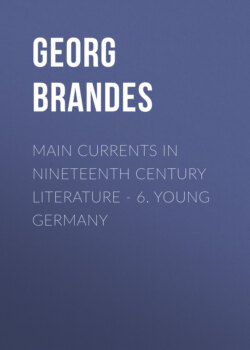Читать книгу Main Currents in Nineteenth Century Literature - 6. Young Germany - Георг Брандес - Страница 8
На сайте Литреса книга снята с продажи.
III SPIRIT OF THE OPPOSITION
ОглавлениеThe most notable of the freedom-loving poets and prose authors of the period are embodiments of some of the shades of opinion which have been alluded to. Adalbert von Chamisso, who, by virtue of his famous prose tale, Peter Schlemihl, and certain of his qualities, belongs to the German Romantic School, while in other respects he approaches more nearly to the French ideal of thought and writing, is, in some of his most characteristic poems, and even in his epigrams, a mouthpiece of the grief of the better sort over the steadily growing political and social reaction. As early as 1822, in his poem, Die goldene Zeit ("The Golden Age"), he ridicules an age in which that man is a Jacobin who has openly expressed his belief that 2 and 2 make 4; in the Nachtwächterlied ("Watchman's Song") he scoffs at the power of the Jesuits; in Joshua and Das Dampfross ("The Steam Horse"), at those who have robbed time of its secret, and learned how to force it backwards day by day; in Das Gebet der Wittwe ("The Widow's Prayer") he gives a darkly pessimistic picture of the heartless rule of the powers that be, with its complete indifference to the fate of the common people; finally he sums up his view of the times in this bitterly humorous quatrain, which greets us sadly in the form of a four-part catch:
KANON.
"Das ist die Noth der schweren Zeit!
Das ist die schwere Zeit der Noth!
Das ist die schwere Noth der Zeit!
Das ist die Zeit der schweren Noth!"[1]
Count August von Platen-Hallermünde, whose youthful efforts were Romantic, both in their choice of subject and in their imitation of the forms of the Spanish drama, afterwards waged systematic war with Romanticism. Its latest developments in Germany he holds up to ridicule, without possessing enough of critical tact to discriminate between the authors who did and those who did not belong to the Romanticist group. He quits the literary drama to cultivate the political lyric muse, as he gradually arrives at the conviction that the pitiable condition of public affairs is also at the bottom of the German people's lack of appreciation of power and style and form in poetry. He finds life in Germany impossible to endure, and seeks, under the sunny skies of Sicily, amidst its reminiscences of antiquity, to forget the heavy atmosphere and the political abuses of his Northern home. But he cannot completely distract his thoughts from the ignominy there. He writes his Berlin national song, which begins with the chorus:
"Diesen Kuss den Moscoviten,
Deren Nasen sind so schmuck;
Rom mit seinen Jesuiten
Nehme diesen Händedruck!"[2]
We find also the following bitter outburst of national self-contempt, written in wrath over the maltreatment of his poems by the censor:
"Doch gieb, o Dichter, dich zufrieden,
Es büsst die Welt nur wenig ein;
Du weisst es längst, man kann hienieden
Nichts Schlechtres als ein Deutscher sein."[3]
Romantically as Platen's adversary, Heinrich Heine, starts, the modern spirit soon makes itself perceptible in his prose. Even before he touches on the subject of politics proper, he amuses himself, in his Reisebilder, by making taunting allusions to German conditions and to the way in which German stolidity accommodates itself to them.
And the love of liberty, abstract, political liberty, was all along the true passion of Ludwig Börne, who long appeared to occupy himself with purely æsthetic matters, being known for whole decades only as a dramatic critic and writer of short stories.
That these authors found readers and admirers bears witness to the fact that the thinking part of the German people at the end of the Twenties was laying aside its faith in authority in the domain of politics as well as in general intellectual matters. At this time the persecution of the students' unions (Burschenschaften) was being carried on with the utmost ardour. They were broken up everywhere. But they formed again at once, and in one German State, Bavaria, after the accession of King Ludwig, they were actually sanctioned by the police. The divisions that occurred among them show the directions of the various currents of public opinion at that time. In Erlangen, after 1827, there were three unions, at feud with each other—Teutonia, Arminia, and Germania.
Teutonia was the organ of pure Romanticism, of religious mysticism, and declared that politics in no way concerned it. Arminia's principles were strict morality and the pursuit of science; it aimed at the reformation of the conditions of public life, and also at the unity and liberty of Germany. Germania answered to the Radical tendencies of the day. It dropped the older Tugendbund's requirement of strict morality, emancipated itself from the rule of authority, including authority in the matter of religion, and declared the belief that its aim—which in the case of this union also was the unity and liberty of Germany—could only be attained by revolution. Though it was essentially a political organisation, it would be ridiculous to call it an important and dangerous one.
These three main movements were soon represented at all the German universities, and significantly enough, it was, as a rule, the one represented by Germania, which had the greatest influence.
[1] This is the need of these hard times! These are the hard times of need! This is the hard need of these times! These are the times of hard need!
[2] This kiss is for the Moscovites, with their handsome noses; this hand-clasp for Rome with her Jesuits.
[3] Console thyself, O poet! 'tis but little the world loses; thou hast long known that on this earth a man can be nothing worse than a German.
